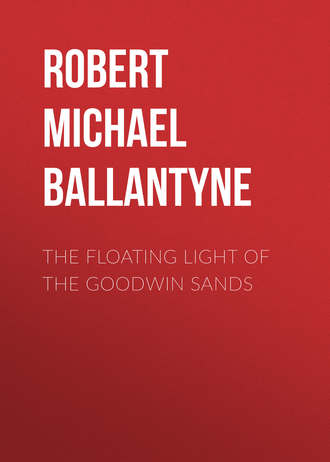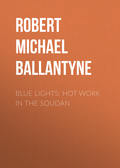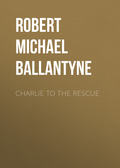
Robert Michael Ballantyne
The Floating Light of the Goodwin Sands
Mr Jones watched his face keenly, and came to the conclusion that he had quelled the boy, and should now find him a willing and useful tool, but in order to make still more sure, he employed the few minutes that remained to him in commenting on the great discomfort of a convict’s life, and the great satisfaction that accrued from making one’s fortune at a single stroke.
This talk was not without its effect. Billy wavered. Before he could make up his mind they were alongside the strange vessel, and next moment on her deck. Mr Jones quickly explained the circumstances of the loss of the Skylark to the sympathetic captain. Billy listened in silence, and, by silence, had assented to the falsehood. It was too late now to mend matters, so he gave way to despair, which in him frequently, if not usually, assumed the form of reckless joviality.
While this spirit was strong upon him he swore to anything. He not only admitted the truth of all that his tempter advanced, but entertained the seamen with a lively and graphic account of the running down of the Skylark, and entered into minute particulars—chiefly of a comical nature—with such recklessness that the cause of Mr Jones bade fair to resemble many a roast which is totally ruined by being overdone. Jones gave him a salutary check, however, on being landed next day at a certain town on the Kentish coast, so that when Billy was taken before the authorities, his statements were brought somewhat more into accord with those of his tempter.
The wily Mr Jones went at once with Billy to the chief officer of the coast-guard on that station, and reported the loss of his vessel with much minuteness of detail—to the effect that she had sailed from London at noon of a certain date, at the quarter ebb tide, the sky being cloudy and wind sou’-west; that the casualty occurred at five p.m. on the day following near the North Foreland Light, at half flood tide, the sky being cloudy and wind west-sou’-west; that the vessel had sunk, and all the crew had perished excepting himself and the boy. This report, with full particulars, was sent to the Board of Trade. Mr Jones then went to the agent for the Shipwrecked Mariners’ Society and related his pitiful tale to him. That gentleman happening to be an astute man, observed some discrepancies in the accounts given respectively by Billy and his master. He therefore put a variety of puzzling questions, and took down a good many notes. Mr Jones, however, had laid his plans so well, and gave such a satisfactory and plausible account of himself, that the agent felt constrained to extend to him the aid of the noble Society which he represented, and by which so much good is done to sailors directly, and indirectly to the community at large. He paid their passage to London, but resolved to make some further inquiries with a view either to confirming or allaying his suspicions.
These little matters settled, and the loss having been duly advertised in the newspapers, Mr Jones set out for London with the intention of presenting his claims to the Insurance Companies.
In the train Billy had time to reflect on the wickedness of which he had been guilty, and his heart was torn with conflicting emotions, among which repentance was perhaps the most powerful. But what, he thought, was the use of repentance now? The thing was done and could not be undone.
Could it not? Was it too late to mend? At the Grotto he had been taught that it was “never too late to mend”—but that it was sinful as well as dangerous to delay on the strength of that fact; that “now was the accepted time, now the day of salvation.” When Billy thought of these things, and then looked at the stern inexorable face of the man by whom he had been enslaved, he began to give way to despair. When he thought of his good angel Nora, he felt inclined to leap out of the carriage window and escape or die! He restrained himself, however, and did nothing until the train arrived in London. Then he suddenly burst away from his captor, dived between the legs of a magnificent railway guard, whose dignity and person were overthrown by the shock, eluded the ticket-collector and several policemen, and used his active little legs so well that in a few minutes his pursuers lost him in a labyrinth of low streets not far distant from the station.
From this point he proceeded at a rapid though less furious pace direct to the Grotto, where he presented himself to the superintendent with the remark that he had “come back to make a clean breast of it.”
Chapter Twenty One.
On the Scent
Let us change the scene and put back the clock. Ah, how many hearts would rejoice if it were as easy to return on the track of Time in real life as it is to do so in a tale!
It was the evening of the day in which Jones and Billy went to sea in the little boat. Ramsgate, Mr Durant’s supper-table, with Stanley Hall and Robert Queeker as guests.
They were all very happy and merry, for Stanley was recounting with graphic power some of the incidents of his recent voyage. Mr Durant was rich enough to take the loss of his vessel with great equanimity—all the more so that it had been fully insured. Mr Queeker was in a state of bliss in consequence of having been received graciously by Fanny, whose soul was aflame with sentiment so powerful that she could not express it except through the medium of a giggle. Only once had Fanny been enabled to do full justice to herself, and that was when, alone with Katie in the mysterious gloom of a midnight confabulation, she suddenly observed that size and looks in men were absolutely nothing—less than nothing—and that in her estimation heart and intellect were everything!
In the midst of his mirth Mr Durant suddenly turned to Queeker and said—
“By the way, what made you so late of coming to-night, Queeker? I thought you had promised to come to tea.”
“Well, yes, but—a—that is,” stammered Queeker in confusion, “in fact I was obliged to keep an appointment in connection with the—the particular business—”
“The secret mission, in short,” observed Katie, with a peculiar smile.
“Well, secret mission if you choose,” laughed Queeker; “at all events it was that which prevented my getting here sooner. In truth, I did not expect to have managed to come so soon, but we came to the boat—”
Queeker stopped short and blushed violently, feeling that he had slightly, though unintentionally, committed himself.
Fanny looked at him, blushed in sympathy, and giggled.
“Oh, there’s a boat in the secret mission, is there?” cried Stanley; “come, let us make a game of it. Was it an iron boat?”
“No,” replied Queeker, laughing, for he felt that at all events he was safe in answering that question.
“Was it a wooden one?” asked Katie.
“Well—ye—”
“Was it a big one?” demanded Mr Durant, entering into the spirit of the game.
“No, it was a little one,” said Queeker, still feeling safe, although anxious to evade reply.
“Was there a man in it?” said Katie.
Queeker hesitated.
“And a boy?” cried Stanley.
The question was put unwittingly, but being so put Queeker stammered, and again blushed.
Katie on the contrary turned pale, for her previously expressed hope that there might be some connection between Queeker’s mission and Billy Towler’s troubles flashed into her mind.
“But was there a boy in it?” she said, with a sudden earnestness that induced every one to look at her in surprise.
“Really, I pray—I must beg,” said Queeker, “that you won’t make this a matter of even jocular inquiry. Of course I know that no one here would make improper use of any information that I might give, but I have been pledged to secrecy by my employers.”
“But,” continued Katie in the same anxious way as before, “it will not surely be a breach of confidence merely to tell me if the boy was a small, active, good-looking little fellow, with bright eyes and curly hair.”
“I am bound to admit,” said Queeker, “that your description is correct.”
To the amazement, not to say consternation, of every one, Katie covered her face with her hands and burst into tears, exclaiming in an agony of distress that she knew it; she had feared it after sending him away; that she had ruined him, and that it was too late now to do anything.
“No, not too late, perhaps,” she repeated, suddenly raising her large beautiful eyes, which swam in tears; “oh papa, come with me up-stairs, I must speak with you alone at once.”
She seized her astonished father by the hand and led him unresisting from the room.
Having hurriedly related all she knew about Billy Towler, Morley Jones, and Nora, she looked up in his face and demanded to know what was to be done.
“Done, my dear child,” he replied, looking perplexed, “we must go at once and see how much can be undone. You tell me you have Nora’s address. Well, we’ll go there at once.”
“But—but,” said Katie, “Nora does not know the full extent of her father’s wickedness, and we want to keep it from her if possible.”
“A very proper desire to spare her pain, Katie, but in the circumstances we cannot help ourselves; we must do what we can to frustrate this man’s designs and save the boy.”
So saying Mr Durant descended to the dining-room. He explained that some suspicious facts had come to his daughter’s knowledge which necessitated instant action; said that he was sorry Mr Queeker felt it incumbent on him to maintain secrecy in regard to his mission, but that he could not think of pressing him to act in opposition to his convictions, and, dismissing his guests with many apologies, went out with Katie in search of the abode of Nora Jones.
Stanley Hall, whose curiosity was aroused by all that had passed, went down to take a walk on the pier by way of wearing it off in a philosophical manner. He succeeded easily in getting rid of this feeling, but he could not so easily get rid of the image of Katie Durant. He had suspected himself in love with her before he sailed for India; his suspicions were increased on his return to England, and when he saw the burst of deep feeling to which she had so recently given way, and heard the genuine expressions of remorse, and beheld her sweet face bedewed with tears of regret and pity, suspicion was swallowed up in certainty.
He resolved then and there to win her, if he could, and marry her! Here a touch of perplexity assailed him, but he fought it off nobly.
He was young, no doubt, and had no money, but what then?—he was strong, had good abilities, a father in a lucrative practice, with the prospect of assisting and ultimately succeeding him. That was enough, surely.
The lodging which he had taken for a few days was retaken that night for an indefinite period, and he resolved to lay siege to her heart in due form.
But that uncertainty which is proverbial in human affairs stepped within the circle of his life and overturned his plans. On returning to his rooms he found a telegram on the table. His father, it informed him, was dangerously ill. By the next train he started for home, and arrived to find that his father was dead.
A true narrative of any portion of this world’s doings must of necessity be as varied as the world itself, and equally abrupt in its transitions. From the lively supper-table Stanley Hall passed to the deathbed of his father. In like manner we must ask the reader to turn with us from the contemplation of Stanley’s deep sorrow to the observation of Queeker’s poetic despair.
Maddened between the desire to tell all he knew regarding the secret mission to Mr Durant, and the command laid on him by his employers to be silent, the miserable youth rushed frantically to his lodgings, without any definite intentions, but more than half inclined to sink on his knees before his desk, and look up to the moon, or stars, or; failing these, to the floating light for inspiration, and pen the direful dirge of something dreadful and desperate! He had even got the length of the first line, and had burst like a thunderbolt into his room muttering—
“Great blazing wonder of illimitable spheres,”
when he became suddenly aware of the fact that his chair was occupied by the conchological friend with whom he had spent the earlier part of that day, who was no other than the man with the keen grey eyes.
“What! still in the poetic vein?” he said, with a grave smile.
“Why—I—thought you were off to London!” exclaimed Queeker, with a very red face.
“I have seen cause to change my plan,” said Mr Larks quietly.
“I’m very glad of it,” replied Queeker, running his fingers through his hair and sitting down opposite his friend with a deep sigh, “because I’m in the most horrible state of perplexity. It is quite evident to me that the boy is known to Miss Durant, for she went off into such a state when I mentioned him and described him exactly.”
“Indeed,” said Mr Larks; “h’m! I know the boy too.”
“Do you? Why didn’t you tell me that?”
“There was no occasion to,” said the imperturbable Mr Larks, whose visage never by any chance conveyed any expression whatever, except when he pleased, and then it conveyed only and exactly the expression that he intended. “But come,” he continued, “let’s hear all about it, and don’t quote any poetry till you have done with the facts.”
Thus exhorted Queeker described the scene at the supper-table with faithful minuteness, and, on concluding, demanded what was to be done.
“H’m!” grunted Mr Larks. “They’ve gone to visit Nora Jones, so you and I shall go and keep them company. Come along.”
He put on his hat and went out, followed by his little friend.
In a lowly ill-furnished room in one of the poorest streets of the town, where rats and dogs and cats seemed to divide the district with poverty-stricken human beings, they found Nora sitting by the bedside of her grandmother, who appeared to be dying. A large Family Bible, from which she had been reading, was open on her knee.
Mr Larks had opened the door and entered without knocking. He and Queeker stood in the passage and saw the bed, the invalid, and the watcher through an inner door which stood ajar. They could hear the murmurings of the old woman’s voice. She appeared to wander in her mind, for sometimes her words were coherent, at other times she merely babbled.
“O Morley, Morley, give it up,” she said, during one of her lucid intervals; “it has been the curse of our family. Your grandfather died of it; your father—ah! he was a man, tall and straight, and so kind, till he took to it; oh me! how it changed him! But the Lord saved his soul, though he let the body fall to the dust. Blessed be His holy name for that. Give it up, Morley, my darling boy; give it up, give it up—oh, for God’s sake give it up!”
She raised her voice at each entreaty until it almost reached a shriek, and then her whole frame seemed to sink down into the bed from exhaustion.
“Why don’t ’ee speak to me, Morley?” she resumed after a short time, endeavouring to turn her head round.
“Dearest granny,” said Nora, gently stroking one of her withered hands, which lay on the counterpane, “father is away just now. No doubt he will be back ere long.”
“Ay, ay, he’s always away; always away,” she murmured in a querulous tone; “always coming back too, but he never comes. Oh, if he would give it up—give it up—”
She repeated this several times, and gradually dwindled off into unintelligible mutterings.
By this time Mr Larks had become aware of whispering voices in a part of the room which he could not see. Pushing the door a little farther open he entered softly, and in a darkened corner of the apartment beheld Mr Durant and Katie in close conversation with James Welton. They all rose, and Nora, seeing that the old woman had fallen into a slumber, also rose and advanced towards the strangers. Mr Durant at once explained to her who Queeker was, and Queeker introduced Mr Larks as a friend who had come to see them on important business.
“I think we know pretty well what the business is about,” said Jim Welton, advancing and addressing himself to Mr Larks, “but you see,” he added, glancing towards the bed, “that this is neither the time nor place to prosecute your inquiries, sir.”
Mr Larks, who was by no means an unfeeling man, though very stern, said that he had no intention of intruding; he had not been aware that any one was ill in the house, and he would take it as a favour if Mr Welton would go outside and allow him the pleasure of a few words with him. Of course Jim agreed, but before going took Nora aside.
“I’ll not be back to-night, dearest,” he said in a low whisper. “To-morrow, early, I’ll return.”
“You will leave no stone unturned?” said Nora.
“Not one. I’ll do my best to save him.”
“And you have told me the worst—told me all?” asked Nora, with a look of intense grief mingled with anxiety on her pale face.
“I have,” said Jim, in a tone and with a look so earnest and truthful that Nora required no further assurance. She gave him a kindly but inexpressibly sad smile, and returned to her stool beside the bed. Her lover and Mr Larks went out, followed by Queeker.
“We won’t intrude on you longer to-night,” said Katie, going up to Nora and laying her hand quietly on her shoulder.
“Your visit is no intrusion,” said Nora, looking up with a quiet smile. “It was love that brought you here, I know. May our dear Lord bless you and your father for wishing to comfort the heart of one who needs it so much—oh, so much.” She put her hands before her face and was silent. Katie tried in vain to speak. The tears coursed freely down her cheeks, but never a word could she utter. She put her arm round the neck of the poor girl and kissed her. This was a language which Nora understood;—many words could not have expressed so much; no words could have expressed more.
Chapter Twenty Two.
Mr Jones is Outwitted, and Nora is left Desolate
When Morley Jones found himself suddenly deserted by his ally Billy Towler, he retired to the privacy of a box in a low public-house in Thames Street, and there, under the stimulus of a stiff glass of grog, consulted with himself as to the best mode of procedure under the trying circumstances in which he found himself placed. He thought it probable, after half an hour of severe meditation, that Billy would return to the Grotto, but that, for his own sake, he would give a false account of his absence, and say nothing about the loss of the Skylark. Feeling somewhat relieved in mind by his conclusions on this head, he drank off his grog, called for another glass, and then set himself to the consideration of how far the disappearance of the boy would interfere with his obtaining payment of the various sums due by the Insurance Offices. This point was either more knotty and difficult to unravel than the previous one, or the grog began to render his intellect less capable of grappling with it. At all events it cost him an hour to determine his course of action, and required another glass of grog to enable him to put the whole matter fairly before his mental vision in one comprehensive view. This, however, accomplished, he called for a fourth glass of grog “for luck,” and reeled out of the house to carry out his deep-laid plans.
His first act was to proceed to Greenwich, where a branch of his fish-curing business existed, or was supposed to exist. Here he met a friend who offered to treat him. Unfortunately for the success of his schemes he accepted this offer, and, in the course of a debauch, revealed so much of his private affairs that the friend, after seeing him safely to his lodging, and bidding him an affectionate farewell, went up to London by the first boat on the following morning, and presented himself to the managers of various Insurance Companies, to whom he made revelations which were variously received by these gentlemen; some of them opening their eyes in amazement, while others opened their mouths in amusement, and gave him to understand that he was very much in the position of a man who should carry coals to Newcastle—they being then in possession of all the information given, and a great deal more besides.
The manager of the Submarine Insurance Company was the most facetious among these gentlemen on hearing the revelations of Mr Jones’s “friend.”
“Can you tell me,” said that gentleman, when he had pumped the “friend” dry, “which of us is likely to receive the distinguished honour of the first visit from Mr Jones?”
“He said summat about your own office, sir,” replied the informer; “leastwise I think he did, but I ain’t quite sartin.”
“H’m! not unlikely,” observed the manager; “we have had the pleasure of paying him something before to-day. Come here, I will introduce you to an acquaintance of Mr Jones, who takes a deep interest in him. He has just arrived from Ramsgate.”
Opening a door, the manager ushered the informer into a small room where a stout man with peculiarly keen grey eyes was warming himself at the fire.
“Allow me to introduce you, Mr Larks, to a friend of Mr Jones, who may be of some use. I will leave you together for a little,” said the manager, with a laugh, as he retired and shut the door.
It is not necessary that we should enter into details as to how Mr Jones went about the business of drawing his nets ashore—so to speak,—and how those who took a special interest in Mr Jones carefully assisted him, and, up to a certain point, furthered all his proceedings. It is sufficient to say that, about a fortnight after his arrival in London—all the preliminary steps having been taken—he presented himself one fine forenoon at the office of the Submarine Insurance Company.
He was received very graciously, and, much to his satisfaction, was told that the claim could now be settled without further delay. Former experience had taught him that such a piece of business was not unusually difficult of settlement, but he was quite charmed by the unwonted facilities which seemed to be thrown in his way in regard to the present affair. He congratulated himself internally, and the manager congratulated him externally, so to speak, by referring to his good fortune in having insured the vessel and cargo to the full amount.
Even the clerks of the establishment appeared to manifest unwonted interest in the case, which gratified while it somewhat surprised Mr Jones. Indeed, the interest deepened to such an extent, and was so obtrusive, that it became almost alarming, so that feelings of considerable relief were experienced by the adventurous man when he at length received a cheque for 300 pounds and left the office with it in his pocket.
In the outer lobby he felt a touch on his arm, and, looking round, met the gaze of a gentleman with peculiarly keen grey eyes. This gentleman made some quiet remarks with reference to Mr Jones being “wanted,” and when Mr Jones, not relishing the tone or looks of this gentleman, made a rush at the outer glass door of the office, an official stepped promptly in front of it, put one hand on the handle, and held up the other with the air of one who should say, “Excuse me, there is no thoroughfare this way.” Turning abruptly to the left, Mr Jones found himself confronted by another grave gentleman of powerful frame and resolute aspect, who, by a species of magic or sleight of hand known only to the initiated, slipped a pair of steel bracelets on Mr Jones’s wrists, and finally, almost before he knew where he was, Mr Jones found himself seated in a cab with the strong gentleman by his side, and the keen grey-eyed gentleman in front of him.
Soon afterwards he found himself standing alone in the midst of an apartment, the chief characteristics of which were, that the furniture was scanty, the size inconveniently little, and the window unusually high up, besides being heavily barred, and ridiculously small.
Here let us leave him to his meditations.
One fine forenoon—many weeks after the capture of Morley Jones—Dick Moy, Jack Shales, and Jerry MacGowl were engaged in painting and repairing buoys in the Trinity store on the pier at Ramsgate. The two former were enjoying their month of service on shore, the latter was on sick-leave, but convalescent. Jack was painting squares of alternate black and white on a buoy of a conical shape. Dick was vigorously scraping sea-weed and barnacles off a buoy of a round form. The store, or big shed, was full of buoys of all shapes; some new and fresh, others old and rugged; all of them would have appeared surprisingly gigantic to any one accustomed to see buoys only in their native element. The invalid sat on the shank of a mushroom anchor, and smoked his pipe while he affected to superintend the work.
“Sure I pity the poor craturs as is always sick. The mouth o’ man can niver tell the blessedness of bein’ well, as the pote says,” observed Jerry, with a sigh, as he shook the ashes out of his pipe and proceeded to refill it. “Come now, Jack Shales,” he added, after a short pause, “ye don’t call that square, do ’ee?”
“I’ll paint yer nose black if you don’t shut up,” said Jack, drawing the edge of a black square with intense caution, in order to avoid invading the domain of a white one.
“Ah! you reminds me of the owld proverb that says somethin’ about asses gittin impudent an’ becomin’ free with their heels when lions grow sick.”
“Well, Jerry,” retorted Jack, with a smile, as he leaned back and regarded his work with his head very much on one side, and his eyes partially closed, after the manner of knights of the brush, “I’m not offended, because I’m just as much of an ass as you are of a lion.”
“I say, mates,” remarked Dick Moy, pausing in his work, and wiping his brow, “are ’ee aweer that the cap’n has ordered us to be ready to start wi’ the first o’ the tide at half after five to-morrow?”
“I knows it,” replied Jack Shales, laying down the black brush and taking up the white one.
“I knows it too,” said Jerry MacGowl, “but it don’t make no manner of odds to me, ’cause I means to stop ashore and enjoy meself. I mean to amoose meself with the trial o’ that black thief Morley Jones.”
Dick Moy resumed his work with a grunt, and said that Jerry was a lucky fellow to be so long on sick-leave, and Jack said he wished he had been called up as a witness in Jones’s case, for he would have cut a better figure than Jim Welton did.
“Ay, boy,” said Dick Moy, “but there wos a reason for that. You know the poor feller is in love wi’ Jones’s daughter, an’ he didn’t like for to help to convict his own father-in-law to be, d’ye see? That’s where it is. The boy Billy Towler was a’most as bad. He’s got a weakness for the gal too, an’ no wonder, for she’s bin as good as a mother to ’im. They say that Billy nigh broke the hearts o’ the lawyers, he wos so stoopid at sometimes, an’ so oncommon cute at others. But it warn’t o’ no use. Jim’s father was strong in his evidence agin him, an’ that Mr Larks, as comed aboard of the Gull, you remember, he had been watching an’ ferreting about the matter to that extent that he turned Jones’s former life inside out. It seems he’s bin up to dodges o’ that kind for a long time past.”
“No! has he?” said Jack Shales.
“Arrah, didn’t ye read of it?” exclaimed Jerry MacGowl.
“No,” replied Jack drily; “not bein’ on the sick-list I han’t got time to read the papers, d’ye see?”
“Well,” resumed Dick Moy, “it seems he has more than once set fire to his premises in Gravesend, and got the insurance money. Hows’ever, he has got fourteen years’ transportation now, an’ that’ll take the shine pretty well out of him before he comes back.”
“How did the poor gal take it?” asked Jack.
Dick replied that she was very bad at first, but that she got somewhat comforted by the way her father behaved to her and listened to her readin’ o’ the Bible after he was condemned. It might be that the death of his old mother had softened him a bit, for she died with his name on her lips, her last words being, “Oh Morley, give it up, my darling boy, give it up; it’s your only chance to give it up, for you inherit it, my poor boy; the passion and the poison are in your blood; oh, give it up, Morley, give it up!”
“They do say,” continued Dick, “that Jones broke down altogether w’en he heard that, an’ fell on his gal’s neck an’ cried like a babby. But for my part I don’t much believe in them deathbed repentances—for it’s much the same thing wi’ Jones now, he bein’ as good as dead. It’s not wot a man says, but how a man lives, as’ll weigh for or against him in the end.”
“An’ what more did he say?” asked Jerry MacGowl, stopping down the tobacco in his pipe with one of his fire-proof fingers; “you see, havin’ bin on the sick-list so long, I haven’t got up all the details o’ this business.”
“He didn’t say much more,” replied Dick, scraping away at the sea-weed and barnacles with renewed vigour, “only he made his darter promise that she’d marry Jim Welton as soon after he was gone as possible. She did nothing but cry, poor thing, and wouldn’t hear of it at first, but he was so strong about it, saying that the thought of her being so well married was the only thing as would comfort him w’en he was gone, that she gave in at last.”
“Sure then she’ll have to make up her mind,” said Jerry, “to live on air, which is too light food intirely for any wan excep’ hummin’-birds and potes.”
“She’ll do better than that, mate,” returned Dick, “for Jim ’as got appointed to be assistant-keeper to a light’ouse, through that fust-rate gen’leman Mr Durant, who is ’and an’ glove, I’m told, wi’ the Elder Brethren up at the Trinity ’Ouse. It’s said that they are to be spliced in a week or two, but, owin’ to the circumstances, the weddin’ is to be kep’ quite priwate.”
“Good luck to em!” cried Jerry. “Talkin’ of the Durants, I s’pose ye’ve heard that there’s goin’ to be a weddin’ in that family soon?”
“Oh, yes, I’ve heard on it,” cried Dick; “Miss Durant—Katie, they calls her—she’s agoin’ to be spliced to the young doctor that was wrecked in the Wellington. A smart man that. They say ’ee has stepped into ’is father’s shoes, an’ is so much liked that ’ee’s had to git an assistant to help him to get through the work o’ curin’ people—or killin’ of ’em. I never feel rightly sure in my own mind which it is that the doctors does for us.”







